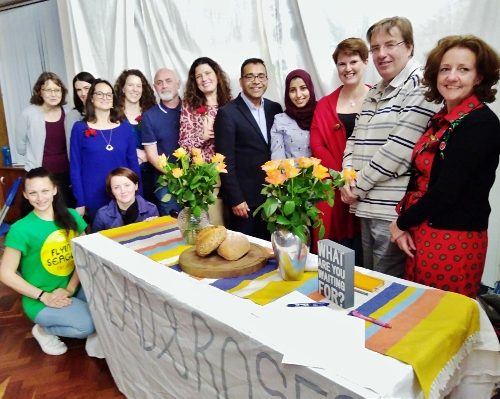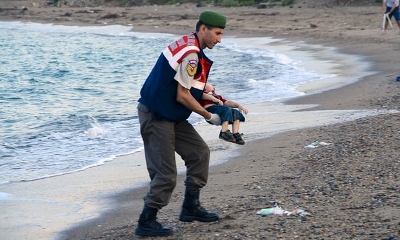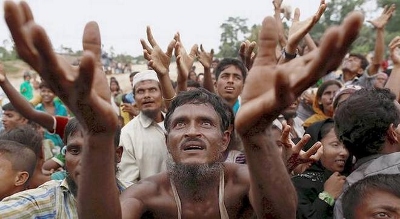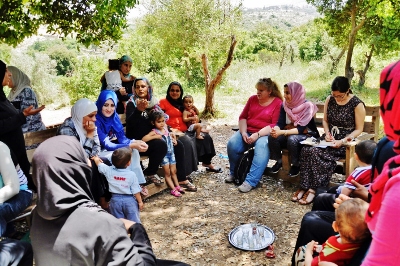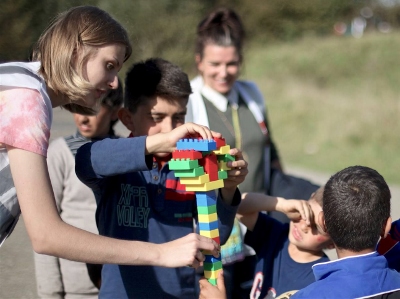Special feature: Thame’s ‘big-heart’ and the refugee crisis
On 24/10/2017 At 1:57 am
Category : Missed a ThameNews story?, More News, Thame news
Responses : No Comments
THE people of Thame, and those involved locally in bringing together individuals ‘with a big heart’ to give aid, welcome and support to displaced people around the world, took the opportunity on Friday (October 20) to hear first-hand accounts from experts about the lives of refugees from conflicts. Their stories prompted some very searching questions for Thame’s MP about the government’s perceived lack of action to help these people, specifically children.
‘Appalling’ conditions
The evening of talks was organised by Bread and Roses Thame, and billed as Refugees: Voices from Beyond The Headlines. Five speakers with first-hand knowledge of life in refugee camps in Lebanon, Greece, Calais and Dunkirk, described movingly the backgrounds and appalling quality of life that millions of displaced people are forced to live because, as they see it, not enough is being done by the British and some other comparatively wealthy nations to offer asylum and sanctuary to more of these people, particularly unaccompanied, and therefore vulnerable children.
Why so few vulnerable, lone children brought into the UK?
Thame-based author, theologian and activist, Dr Krish Kandiah, questioned the government’s commitment to basing its help on helping only those in camps near to their own homeland and for not carrying out its obligation under the Dubs Amendment, having taken in no unaccompanied children this year. His main point was that there is value and potential in every single person. He asked why only 280 unaccompanied children had been taken in so far, why John Howell had voted against the Dubs Amendment, and what more we could do to help these kids?
Dr Kandiah described how many of the children, particularly those who had arrived in Kent, had made their own, dangerous way and needed foster parents. He spoke of how the images on our TVs of a dead toddler washed up on a Greek shore, changed public opinion, and encouraged the government to say it would take 3,000 unaccompanied children from Europe ( a pledge later rescinded by the government in February this year after only 350 in total had been brought over since the Immigration Act had been passed).
66 Million displaced people!
John Howell MP acknowledged that Dr Kandia had painted ‘a moving picture’ but said that he did not intend to answer his questions directly. Instead he spoke about the current global picture, including the latest crisis involving the Rohingya muslims of Burma, which were adding to the 66 million displaced people around the world, not counting economic migrants. He preferred, he said, a long-term approach where efforts are concentrated on how we can bring to an end the reasons for the displacement and helping neighbouring countries like Jordan, and helping to ensure that migrants are safe and not exploited.
“We need to concentrate on the causes,” he concluded. (You can read a version of more-or-less John’s presentation, including the many facts and figures he quoted in his talk, published on his website HERE over the weekend)
In contrast, Conflict and Humanitarian Action specialist, Abeer Al-Mutawakel’s talk concentrated on the here-and-now plight of Lebanon, a very poor country, which had taken in six million refugees, the 1.5 million of which are Syrian, being 30% of the total population of Lebanon! In contrast, the UK has taken in 0.01% of its population, she pointed out.
Woman’s dead body kept in a plastic bag!
Abeer described a recent field trip she had made with Oxford Brookes University to Shheem, an informal camp for Syrians in Lebanon – a country already fragile with 450,000 Palestinian refugees before the Syrian crisis erupted. She described how the whole camp has just three toilets for the men, the struggle the men have to find work to support their families, having to take lesser jobs than the Lebanese themselves; how five to 10 people have to live in damp and smelly rooms 3 x 4 metres; how 70% ‘a lost generation’ of 800 children cannot read or write, how one woman’s dead body had to be kept in a plastic bag for three months, because her relatives could not afford the US$ 5,000 it costs to bury their dead, until someone had donated the money. Now they have bought a piece of land to bury Syrians, but they have to bury multiple bodies in one grave.
Speaking of the plight of refugees, Abeer became very emotional concluding: “These people had a proper life back in their own country. They didn’t chose to leave: They were forced to leave as I was from Yemen. Please do what you can. Feel their pain.”
(You can read more about Abeer’s trip HERE
Founder member of Bread and Roses Thame, Sarah Weston, thanked Abeer, saying: “It is very humbling to hear the stories of these refugees. Thank you for reminding us that change can happen and that people are trying to change things.”
How many refugees come to Europe and why?
Another founder member of BRT, Helen Flitton, then introduced the next speaker, David Bailey, an A&E Staff Nurse at John Radcliffe Hospital, NHS Campaigner and member of Oxfordshire Refugee Solidarity. He pointed out that most immigrants and refugees in this country are working and contribute to our economy: “These migrants are human beings like us and need our help,” he said. He explained that 75% of refugees are internally displaced and that only 1%, come to Europe. They want to come to England, he said, because they see us as a fair and tolerant country, ‘not for the benefits!’ Those claiming asylum are only entitled to £37 per week he explained.
‘We sell the arms that cause conflicts that cause refugees’
“Around 30% of refugees are fleeing wars for which we export weapons. So we are ourselves partly responsible for their displacement,” he said.
David described his experiences of being involved with the Oxfordshire Refugee Solidarity group, taking convoys of donated goods to Calais and Dunkirk, first finding themselves banned by the French from entering and being ‘kettled’ at the French border, but since managing to make several successful trips, in one case, just a day before ‘the Jungle’ camp at Calais was demolished. He described the camp as ‘a chaotic and dangerous place’ for the 1,500 vulnerable, unaccompanied young people there. He said that the UK pays the French police 80 million euros to stop these people from coming over here, and described how they repeatedly rip down tents, burn bedding and spray tear gas over everything and pepper spray food.
Convoys of aid from Oxford to camps in France
He spoke of the vulnerability of kids to trafficking and abuse, and the growing problem of mental health problems among the refugees in these camps and asked: “Why can’t we spend that money bringing them over here? Many of them have family members in the UK they want to go to.”
He criticised those who say that ‘there is no more room in the UK for refugees. “Only 7% of the land in the UK is build on,” he said.”That leaves 93% unoccupied.”
David described how the convoys take over toys, water-proofs, boots, paper and pens and footballs for the kids, who are not in school and have nothing to do. He concluded: “It is heartbreaking to see how the police dismantle the camps, ruin all their personal belongings and put them on buses and take them away.”
You can find out more about Oxfordshire Refugee Solidarity HERE and contact them via Facebook HERE
Abuse, torture, bereavement and mental health problems
Dr Ann Lorek, an expert in the physical, mental health and developmental needs of unaccompanied asylum-seeking children and refugees, spoke about the health needs of Refugee children. She began by speaking about the culture of Welcome in particularly Jordan, where refugees are considered to be ‘the guests of the King of Jordan’. She said that the numbers we have taken are ‘meaningless’ compared with what other countries are doing.
The reasons to leave for these people are many she explained. Some of them for instance, may have been child soldiers who face mental health risks from their experiences. The closure of European routes, she said, had led to more people taking dangerous sea crossings, with 51% of those from Libya for instance reporting trauma en route, which would have been beatings, torture, death of family members, sexual abuse etc. “The impact of their experiences,” she explained, “resulting in nightmares, self-harm, anger-management problems and more.”
Dr Lorek spoke about how important it is for the children to have normal activities like school etc, and how there are Child Protection issues around bullying, FGM of girls – a third of the girls reported having been raped. She spoke about how the Red Cross and Red Crescent organisations were trying to find lost families to reunite the children with. She concluded with a quote from a refugee:
“Once you become a refugee, your life is never complete. There’s always a part of your life missing.”
The Flying Seagull
The final speaker at the Bread and Roses Thame event, which was held at John Hampden School in Thame, was Beckie Briley, representing The Flying Seagull Project, which, in their own words, takes ‘love, light and laughter’ to refugee camps as well as hospitals, orphanages, marginalised communities and slums around the world through games, arts, music, craft, clowns and circus shows. They work closely with local organisations to pinpoint need and tailor their work accordingly.
Beckie explained how, for kids with trauma, using their imaginations and play is very important, and how bereavement can be expressed through play. Speaking about Flying Seagull’s recent United in Laughter project in Greece, where she witnessed the water and the food being turned off and the local police tear-gasing the refugees, she said: “The camp there was horrific.”
Nevertheless, she recalled ‘the energy of 12,000 kids and the joy on their faces at the magic show the group put on for them. At times, Beckie said she found the tension that was often palpable amongst the children, melt away once their trust had been gained.
Questions and Answers
During the Q and A session that followed, John Howell MP was asked about the value of, and asked to share his personal views about, the UK Arms Trade. He admitted that he had no idea of the value of the British Arms Trade, adding: “It is difficult to answer what the impact of the arms trade is.” Referring to the war in Yemen, he said that there was a need to stop the rebels who are supported by the Iranian military. He was asked why the UK was not delivering on the needs of these desperate people when we have ‘the supply side’, people longing to be matched with the need, and able to deliver. Why are they being stopped?
The MP replied that, whilst he had heard ‘the fantastic work being done by ordinary people’, it was his view that it was better for the government to work on stopping refugee crises happening in the first place, tackling, what he called ‘the crisis of governance around the world‘ and to do what it could to rebuild communities. He said that he was ‘putting pressure on the government to make sure schemes were working’, and that he could see ‘no reason why they (asylum seekers) should not be able to join their families’.
Dr Kandiah said that ‘we should take our fair share of refugees, and if we did, we would be setting an example to other countries like the Saudis who take none.”
David Bailey then told John Howell: “Fighter jets have been sold to Turkey to use against the Kurds, causing refugees; cluster bombs sold to the Yemen. I care about what my government does in my name. It cannot be beyond us, the sixth most richest nation in the world, to do more.” He then asked the MP why he was against the Dubs Agreement.
John Howell replied that he wanted to protect kids. He then, in passing, mentioned the group of children that had been taken in by Oxford, adding: “And we all know about the sexual abuse and child protection issues that Oxford has had recently!” – A remark felt to be ‘inappropriate’ by at least one audience member.
Dr Ann Lorek told the audience that there are children in Greece who have been given approval but have not been allowed to come here.
Name just one thing we should all do!
All the speakers were asked to say, if there was just one thing they could advise members of the audience to do to help refugees, or one thing they would like to see happen, what would it be?
David Bailey said: “Go and see for yourself! Our organisation will take you along on one of our convoy visits for around just £50.” He recommended that people look at the website ‘Are you Syrious’ LINK HERE
Abeer Al-Mutawakel said that her one thing, would be for child marriage to stop; (during her visit to the camp in Shheem she was struck by the pregnancy rate among young women. Most young women in that camp were pregnant and had babies and toddlers at the same time which gave her concern for the opportunities for the coming generation).
John Howell asked that everyone present join him in spreading the word to the doubters that the 0.7% of UK GDP spent on foreign aid, IS worth it.
Dr Krish Kandiah told the audience: “Open your eyes as if YOU were in that situation and think what YOU would like someone to do for you.”

